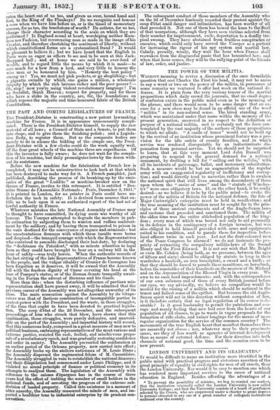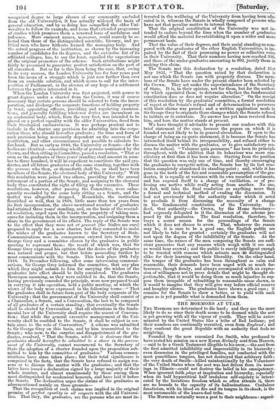LONDON UNIVERSITY AND ITS GRADUATES:*
IT would be difficult to name an institution more identified in the public mind with practical progress and victorious assertion of the great principle of equality in civil rights for men of all creeds, than the London University. Nor would it be easy to mention one which has rendered more important services to the cause of national education in England. Besides affording the advantages of a * To prevent the possibility of mistake, we beg to remind our readers, that the institution originally called the London University is now called University College ; and that the University consists of a board of gentlemen selected by the Crown, who are empowered under a charter to grant degrees to persons educated in any one of a great number of collegiate institutions scattered over the country. recognized degree to large classes of our community excluded from the old Universities, it has actually widened the basis of general education, and by so doing has compelled the elder Uni- versities to follow its example, and issue that extended programme of studies which promises them a renewed lease of usefulness and influence. More eminent names, moreover, could scarcely be se- lected than those of the distinguished scientific, literary, and po- litical men who have hitherto formed the managing body. And the actual progress of the institution, as shown by the increasing number of candidates for its degrees, and the extensive list of its affiliated colleges, has, to say the least, equalled the expectations of the original promoters of the scheme. Such attributions might fairly be presumed to guarantee perfect satisfaction on the part of all concerned. But so far is this from being the ease, that, owing to its very success, the London University has for four years past been the arena of a struggle which is just now farther than ever from an amicable solution, and which seems to call for the inter- position of Parliament, in the absence of- any hope of a settlement between the parties interested in it. When the London University was first projected, with power to grant degrees under a charter from the Crown' it was of course necessary that certain persons should be selected to form the incor- poration, and discharge the corporate functions of holding property in trust, appointing officers, providing and regulating examina- tions and generally fulfilling whatever duties are incumbent on an academical body, which, from the very first, was intended to be placed on a perfect equality with the older Universities, freed from their theologual exclusiveness. It was perhaps prudent not to include in the charter any provision for admitting into the corpo- ration those who should hereafter graduate ; the time and form of such provision being necessarily dependent on the success of the institution, and other circumstances not possible to calculate be- forehand. But as early as 1840, the University or Senate—for the bodies are identical—consisting wholly of persons nominated by the Crown, and then sitting in Committee, passed a resolution, "That as soon as the graduates of three years' standing shall amount in num- ber to three hundred, it will be expedient to constitute the said gra- duates, and all future graduates of the same standing, together with the persons who then' or thenceforth shall be, or shall have been members of the Senate, the electoral body of this University." With this resolution were joined two others, providing for the annual retirement of a portion of the Senate, and assigning to the electoral body thus constituted the right of filling up the vacancies. These resolutions, however, after passing the Committee, were subse- quently rescinded by the same body sitting as a Senate, and the matter was altogether dropped. Meanwhile, the institution flourished so well, that in 1848, little more than ten years from its first incorporation, the above-mentioned number of graduates had attained three years' standing, and, on the basis of the rescind- -a resolution, urged upon the Senate the propriety of taking mea- sures for including them in the incorporation, and assigning them a share in the government of its affairs. The reply of the Senate was to the effect that they were not at present (the Italics are ours) prepared to apply for a new charter, but they consented to make the wishes of the graduates known to the Secretary of State. Communications were in consequence entered into between Sir George Grey and a committee chosen by the graduates in public meeting to represent them ; the result of which was, that Sir George Grey expressed his opinion that the desire of the graduates was natural and proper, but that before proceeding further he must communicate with the Senate. This took place 28th July 1848. In December following, after some intervening communi- cations Sir George Grey formed the committee, that any plan which they i might submit to him for carrying the wishes of the graduates into effect should be fully considered. The graduates thereupon assuming, as they were entitled to do, that the Senate, having previously conceded the principle, were now prepared to aid in carrying it into operation, held a public meeting, at which the views of the body were expressed in the following terms—" That the graduates shall in future form part of the body corporate of the University; that the government of the University shall consist of a Chancellor, a Senate, and a Convocation, the last to be composed of all graduates of a certain standing; that eventually the Senate shall be elected by Convocation ; that all alterations in the funda- mental law of the University shall require the assent of Convoca- tion; that while the general executive management of the Uni- versity shall be confided to the Senate, it shall be subject in cer- tain cases to the veto of Convocation." A scheme was submitted to Sir George Grey on this basis, and by him transmitted to the Senate; who now, to the surprise and disappointment of the gra- duates, resolved, " That the Senate, while it is desirous that the graduates should hereafter be admitted to a share in the govern- ment of the University, cannot recommend to the Secretary of State the adoption of a charter founded upon the proposition sub- mitted to him by the committee of graduates." Various commu- nications have since taken place ; but their total significance is comprised in the facts, that the Senate have refused to assign rea- sons or to discuss the matter with the graduates ; and that the latter have issued a declaration signed by a large majority of their whole number, and almost unanimously by those among them most distinguished for academical honours, and have laid it before the Senate. The declaration urges the claims of the graduates as aforementioned mainly on these grounds—
That the recognition of such claims was implied in the original promise of perfect equality in all respects with the old Universi- ties. That they, the graduates, are the persons who are most in- terested in the wellbeing of the University from having been edu- cated in it, whereas the Senate is wholly composed of persons who have not that peculiar motive to interest them. That the original constitution of the University was not in- tended to endure beyond the time when the number of graduates would afford the material for establishing it upon a wider and more permanent basis. That the value of their degrees, and their social standing as com- pared with the graduates of the other English Universities, is im- paired by the fact of their possessing no power or collective voice in their University. That their numbers having now reached. 546, and those of the under-graduates amounting to 802, justify them in making this claim. The Senate met this decimation by a resolution, dated 21st May 1851, "That the question raised by that declaration is not one which the Senate can with propriety discuss. The mem- bers of the Senate have under the present charter been selected by the Crown. They act under the superintendence of the Secretary of State. It is, in their opinion, not for them, but for the author- ity which appointed them, to determine whether the fundamental constitution does or does not require alteration." On the receipt of this resolution by the graduates' committee, a formal resolution of regret at the Senate's refusal and of determination to persevere with their claims was passed ; and a written application made to Sir George Grey to originate those changes which the Senate refused to initiate or to entertain. No answer has yet been received from him and here the matter stands at present.
We have thought it advisable to present our readers with this brief statement of the case, because the papers on which it is founded are not likely to be in general circulation. If open to the charge of being an ex-parte statement, it is because the Senate has intrenched itself behind its irresponsibility, and refused either to discuss the matter with the graduates, or to give satisfactory rea- sons for refusal. " Volumus quia possumus" has been its principle throughout, with the addition that its behaviour was more con- ciliatory at first than it has been since. Starting from the position that the question was only one of time, and thereby encouraging the graduates to energetic action, the Senate has by its last reso- lution completely abandoned its standing-point ; and, while it has gone in the teeth of the fair and reasonable presumption of the gra- duates, it is equally at variance with its own recorded sentiments, and has exposed itself to a charge of vacillation, or of pro- fessing one motive while really acting from another. No one, in fact, will take the final resolution as anything more than a formal and technical method of evading the discussion. It had not previously held the authority under which it acted to preclude it from discussing the necessity of a change in the fundamental constitution of the University. In- deed, that authority—the Crown, by the Home Secretary— had expressly delegated to it the discussion of the scheme pro- posed by the graduates. The final resolution, therefore be- trays a secret reason for the proceedings of the Senate which it does not choose to avow. That, whatever the reason may be, it is sure to be a good one, the English public are not likely to take for granted : certainly the graduates will not rest upon the dogma of the infallibility of the Senate. At the same time, the names of the men composing the Senate are suffi- cient guarantee that any reasons which weigh with it are such as would bear avowal ; and the public is surely intelligent enough to be trusted with reasons which actuate men so distinguished alike for their learning and their liberality. On the other hand, the temper of the graduates has been throughout so calm and reasonable the demands have been urged with so much for- bearance,
reasonable, firmly, and always accompanied with an expres- sion of willingness not to press details that might be thought ob- jectionable, that it would be doing them as much injustice to sup- pose them incapable of submitting to reasonable cause shown, as it would to imagine that they will give way before official reserve and haughty silence. The graduates have shown a good case ; it remains for the Senate to show a better, or to yield with such grace as is yet possible what is demanded from them.



























 Previous page
Previous page